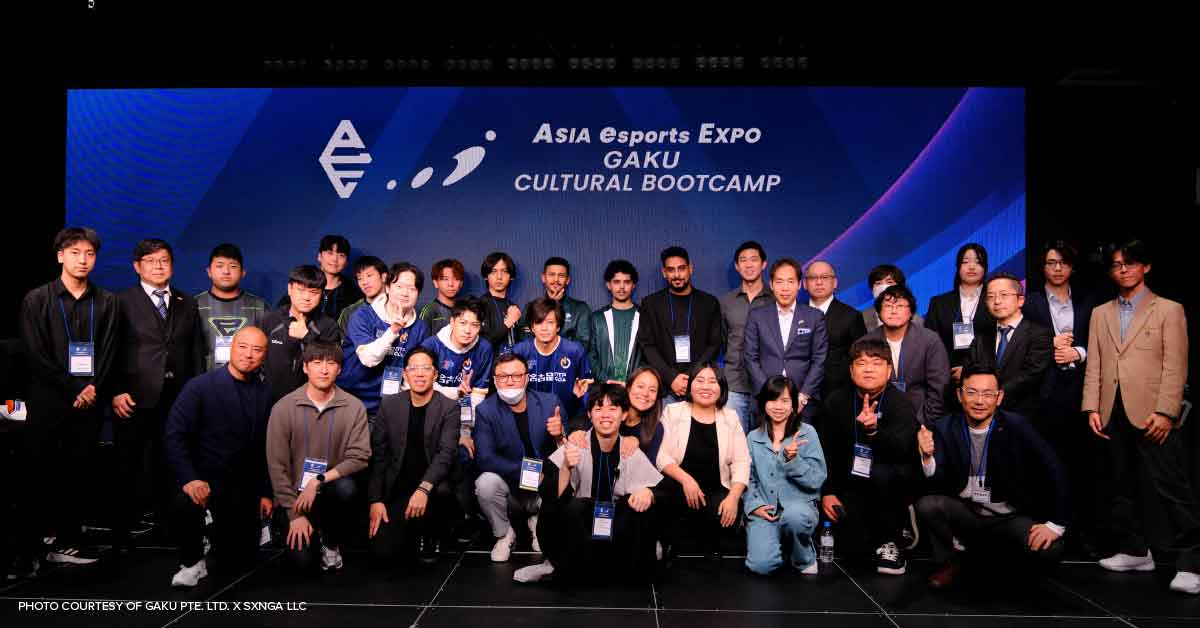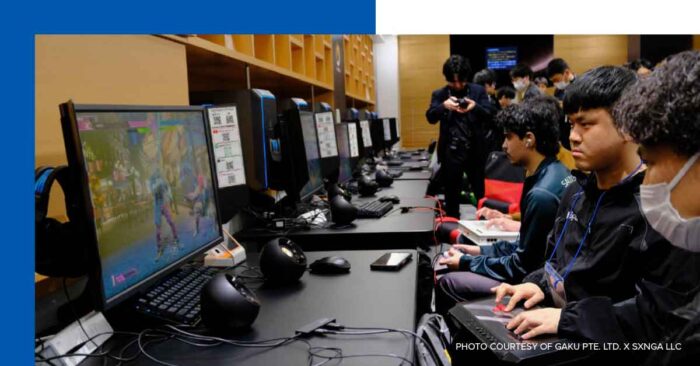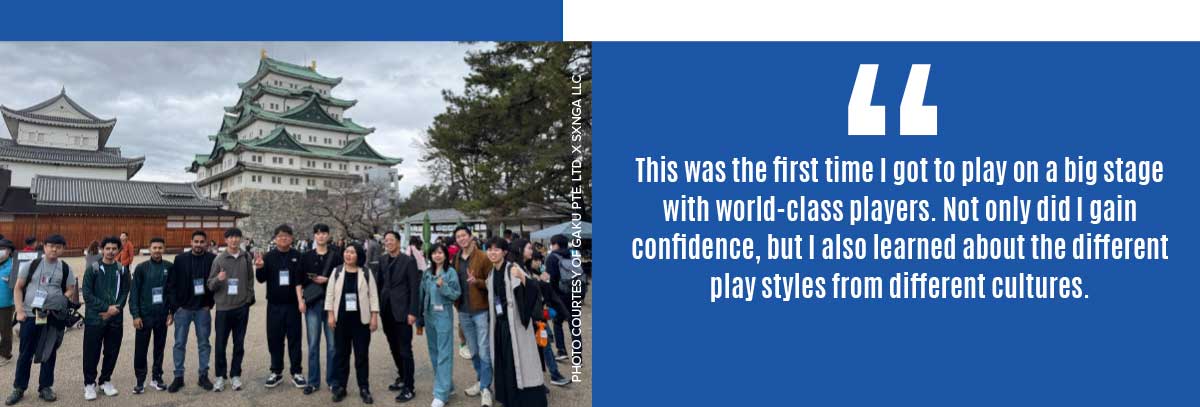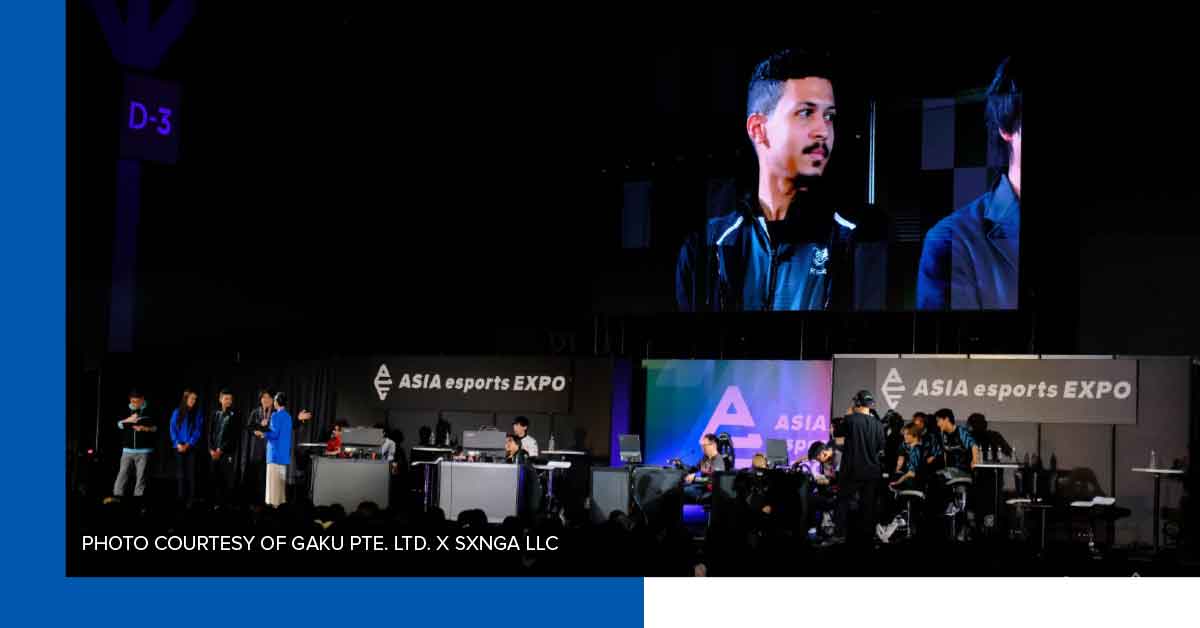
June 3, 2025
Cultural Exchange Through Esports
GAKU Cultural Bootcamp 2025 Kicks Off in Nagoya
Six nations converge in Nagoya for a groundbreaking fusion of competitive gaming and cultural diplomacy, offering North American esports a blueprint for community-centered venues and public-private partnerships ahead of the 2026 Asian Games.
By Jorrel Batac, Sayo Okamoto, and Bethany Pyles
June 3, 2025

From March 27 to March 30, 2025, the city of Nagoya, Japan played host to the first GAKU Cultural Bootcamp of the year, an initiative designed to fuse the worlds of esports and cultural exchange. Organized by GAKU in partnership with several international and regional esports organizations, this unique four-day event brought together youth, athletes, and leaders from six countries — Japan, Saudi Arabia, South Korea, Singapore, Mongolia, and the United States — for a transformative experience at the intersection of gaming, learning, and international collaboration.
Held across some of Nagoya’s top-tier esports venues, including NTP Esports PLAZA, Commufa eSports Stadium NAGOYA, and the expansive Aichi Sky EXPO, the bootcamp demonstrated how esports can serve not only as a competitive platform, but also as a powerful tool for diplomacy, education, and community-building. More than a tournament, it was a living showcase of how esports can bring the world closer together.
A Celebration of Unity Through Play
At its core, the GAKU Cultural Bootcamp was built on the belief that esports is more than entertainment — it’s a medium for connection. With attendees ranging from rising esports athletes and coaches to organizational representatives and cultural ambassadors, the program was carefully crafted to promote interaction both on and off the screen.
The opening day set the tone with registration at the Tokyu Hotel, followed by an orientation and the first bootcamp session at NTP Esports PLAZA. Participants immediately dove into collaborative training exercises, warm-up games, and team-building activities, facilitated by experienced mentors and translators. The atmosphere was one of mutual respect, excitement, and curiosity.
 The following day, participants explored the historic Nagoya Castle, offering a rich cultural experience alongside their esports education. For many international guests, it was their first glimpse into traditional Japanese architecture, history, and customs. The juxtaposition of old and new — castles by day and controllers by night — captured the spirit of the bootcamp perfectly.
The following day, participants explored the historic Nagoya Castle, offering a rich cultural experience alongside their esports education. For many international guests, it was their first glimpse into traditional Japanese architecture, history, and customs. The juxtaposition of old and new — castles by day and controllers by night — captured the spirit of the bootcamp perfectly.
Training resumed in the afternoon at Commufa eSports Stadium, one of Japan’s premier esports facilities. Here, players engaged in drills and friendly matches in popular titles such as Gran Turismo 7, Street Fighter 6, and eFootball. These sessions went beyond gameplay, focusing on communication, strategy, and cross-cultural teamwork.
Grand Stage, Global Players
One of the most unforgettable moments came on Day 3 and 4, when participants had the chance to preview the Asia Esports EXPO 2025 venue at Aichi Sky EXPO. This sprawling convention space was transformed into a live esports arena, complete with a massive stage setup where athletes were invited to compete in front of 10,000 attendees.
For many, the opportunity to play on such a professional stage was a dream come true. “This was the first time I got to play on a big stage with world-class players,” said a participant from Korea. “Not only did I gain confidence, but I also learned about the different play styles from different cultures.”
Beyond competition, the experience highlighted the importance of global investment in esports infrastructure. Companies like GAKU showcase how hosting international camps can foster local economic activity while nurturing global talent.
 Cultural Exchange at the Center
Cultural Exchange at the Center
While the bootcamp’s esports component was central, cultural exchange was interwoven throughout the experience. Whether through shared meals, guided tours, or casual late-night conversations at the hotel, participants learned about one another’s backgrounds, values, and aspirations.
Dinner on the first evening was held at The Kawabun Nagoya, one of the city’s oldest and most iconic venues, known for its blend of traditional Japanese cuisine and modern hospitality. Over a formal dinner and heartfelt conversations, friendships were formed that will last far beyond the camp.
The final evening featured group reflections and a small closing celebration, where teams expressed gratitude for the new friendships and insights they had gained. “The cultural experience at Nagoya Castle was incredible,” said a participant from Saudi Arabia. “I also loved learning all my of the different strategies from players from around the world.”
Pathway to the 2026 Asian Games
The 2025 GAKU Cultural Bootcamp served not only as a standalone experience but also as a preview of what lies ahead: the Aichi-Nagoya 2026 Asian Games. Scheduled for September 19 to October 4, 2026, the Games will feature esports as an official medal event for the second time in history.
With 11 categories confirmed, including League of Legends, Gran Turismo 7, PUBG Mobile, and Street Fighter, the Asian Games will continue to push esports into the mainstream. Notably, many of these titles were featured at the GAKU bootcamp, offering participants a rare opportunity to train in the same games and venues that will be featured at the Games themselves.
The bootcamp offered early exposure to the infrastructure being prepared for the 2026 Asian Games. Venues like Aichi Sky EXPO and Commufa eSports Stadium will serve as critical components of the Games, and the bootcamp effectively tested their readiness while building international awareness.
Lessons for North America
Esports as a Cultural Engine
North American esports stakeholders stand at a pivotal crossroads. While the region boasts impressive commercial success with franchised leagues and high-profile events, Asia’s holistic approach to esports development—as exemplified by the GAKU Cultural Bootcamp—offers valuable lessons that could transform North America’s esports ecosystem from merely entertainment to a powerful vehicle for cultural exchange and youth development.
Community-Centered Infrastructure
Unlike North America’s predominantly corporate-owned facilities, Asian esports venues like Commufa eSports Stadium NAGOYA are designed with community integration at their core. These spaces function as cultural hubs where gaming coexists with education, workforce development, and civic engagement. The result is an ecosystem where esports venues become anchor institutions in urban planning—much like libraries or community centers—rather than standalone commercial enterprises.
Public-Private Partnership Models
While North America’s esports growth has been primarily market-driven, Asia’s approach leverages strategic government partnerships without sacrificing innovation. The collaboration between GAKU and entities like the Aichi Prefecture showcases how public resources can amplify private initiatives, creating sustainable ecosystems that serve both competitive excellence and community needs. North American municipalities and states could adopt similar frameworks to position esports as regional economic and cultural assets.
Embracing Platform Diversity
The bootcamp’s incorporation of both mobile and traditional platforms reflects Asia’s platform-agnostic approach to esports. Rather than the PC/console-centric model dominant in North America, Asian ecosystems embrace technological accessibility, recognizing that mobile platforms can serve as gateways to broader participation, particularly among underrepresented communities. This inclusive approach could help North American organizations reach beyond their traditional demographic boundaries.
Educational Pathways
The GAKU Bootcamp’s emphasis on skill development, cultural exchange, and personal growth demonstrates how competitive gaming can be aligned with educational objectives. North American academic institutions could develop similar programs that create legitimate pathways from competitive play to career development — whether in gaming or adjacent industries. By adopting these principles, North America has the opportunity to transform its esports landscape from a predominantly commercial entertainment sector to a dynamic ecosystem that nurtures global citizenship, cultural understanding, and holistic youth development—all while maintaining competitive excellence.
What’s Next?
With the first 2025 bootcamp now complete, GAKU is already looking ahead. The organization aims to host more camps across Asia and beyond, each one reflecting the unique spirit and culture of its host city. These events are not only training grounds for aspiring players — they are bridges connecting diverse communities through shared passion.
Cities, countries, and institutions interested in hosting future bootcamps are encouraged to reach out. As GAKU continues to grow, so too does its mission to create a more connected, collaborative, and culturally rich esports ecosystem.
Categorized in: EsportsNext Magazine





